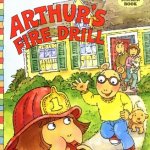Seven Fire Safety Tips for Families
 Today, Priya shares seven fire safety tips for families:
Today, Priya shares seven fire safety tips for families:
Last month, not long after we had put our kids to bed, all of our fire alarms went off simultaneously without any obvious reason; no one was cooking and we didn't have a fire burning in the fireplace. I reflexively went looking for the trigger, and my husband immediately went upstairs to get the kids. When the episode was over, it occurred to me that Pete and I should devise a fire safety plan, particularly given that we know two families in our own town whose homes were destroyed by fires. Fortunately, our incident was merely a function of alarm malfunction, but it motivated us to get more prepared. I wanted to share our process with you:
1. Get up to code. When we renovated our home, we were required by the fire department to install new fire detectors in each bedroom and a heat sensor in the garage. It was pricey--about $1,500 of electrical work was required--but when the alarm went off the other night, we heard it loud and clear from every single room in the house. It made me glad to know that if it had been the real thing, there was no way any adult in the house would sleep through it because, according to FEMA, the leading human factor contributing to fire related injuries in homes is being asleep.
If you don't have a fire alarm in every room, have at least one properly functioning alarm on each floor that you can hear when you are in your bedroom. This alone makes your family significantly safer as two-thirds of home fires that kill children occur in homes without a working smoke alarm. Test your alarm monthly and replace the batteries every 6 months.
2. Have two ways out. The thing that struck me the most after our false alarm was that my first inclination was to determine if there was a fire instead of getting to a safe place. According to FEMA, 34% of fire related injuries in homes result from trying to control a fire followed by attempting to escape. If you hear an alarm, turn your attention to getting out of your house. Have at least two ways out of every room because in a real fire you may not be able to use the door. If your second way out is a window, make sure it can open and close (especially if you paint them) and that screens or bars can be removed quickly. If you have a second floor, invest in escape ladders that are certified by a nationally recognized laboratory (Underwriters Laboratory being the most well-known). If you have kids who are too little to climb down themselves, keep a harness near the ladder that will allow you to carry your child while keeping your hands free to hold onto the ladder.
3. Teach your kids what to do. A great way to introduce kids to fire safety is through books, such as Fire! Fire! and Arthur's Fire Drill. According to this fact and how-to document on fire safety, children as young as 3 can follow a fire escape plan if they have practiced it enough.

4. Get fire extinguisher training. Every house should have strategically placed fire extinguishers (these also come certified by UL), but a fire extinguisher won't help if you don't know how to use it. Local fire departments offer training in proper use of fire extinguishers.
5. Keep a safe sleep environment. To protect your child in the case of a fire, keep bedroom doors closed when your child is sleeping because doors act as barriers to fire and smoke. In addition, make sure your child's pajamas comply with flammability requirements. If you buy pajamas that are not treated with flame retardants (such as anything organic) make sure that the pajamas are snug fitting on your child (i.e., avoid the urge to buy something big to make it last longer).
6. Get a fire safe. Families often try to save valuables in an emergency. Wedding albums, baby pictures, and family heirlooms can all be kept in heavy duty fireproof safe so that in an emergency, you can concentrate on getting yourself out without a moment's thought to saving keepsakes.
7. Learn where your emergency shut off is. If you have oil, there is an emergency shut off switch that cuts power to your boiler. If you have gas, each gas appliance will have a shut off valve and there will be an emergency shut off valve that cuts the supply to your entire house, usually outside by the meter. Only if it is safe, in the event of a fire, turn the boiler switch or gas valve off to help cut off fuel to a fire.
I hope none of you will ever need to escape an actual fire but will feel better being more prepared. If you want to learn more about fire and emergency preparedness, visit ready.gov and usfa.fema.gov and if you have other tips, please share them in the comments!
